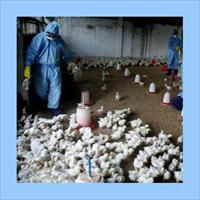TOGO: 17,000 poultry killed in latest flu outbreak

Some 17,000 birds died or have been culled since the outbreak of the H5N1 avian flu virus on 9 September on three poultry farms in Agbata, located 10km east of Lome, according to the country’s livestock director, Komla Batawui.
Zero tolerance
The UN Food and Agricultural Organization adviser to the government, Jacques Conforti, says the risk has been contained. “We focused on free-range poultry, and did not cull poultry in coops in the areas surrounding Agbata. This [the culling] should reduce the risk of the virus spreading to zero.”
Conforti says the disinfection has moved along quickly in the past three weeks, “We do not want to lose any time. We try to disinfect a zone in less than 24 hours before moving to the next at-risk area.” He says officials meet with farmers who point out any sick birds, cull the birds, and pay the farmers for the value of the bird, eggs or bird feed that is destroyed.
Officials have paid close to US$9,000 so far to farmers to compensate them for their losses since the latest outbreak.
Togo’s Minister of Agriculture, Kossi Messan Ewovor, told IRIN this money helps the farmers step forward with their suspicions about sick birds that may carry the deadly H5N1 virus. “This is to assure the poultry farmers they have nothing to lose, and everything to gain in culling sick birds because they help keep their regions and the entire country safe.”
Alphonse Tognizoun, a poultry farmer in Agbata, told IRIN he lost more than 1,000 birds as well as some poultry feed. “I got US$4 per bird and half the value of the food for my birds that was also destroyed, or about 33 US cents per kilo. I didn’t lose eggs, but others who did were paid 6 US cents per egg.”
Following the country’s first outbreak of the virus in August 2007, the World Bank had pushed for farmer payments to encourage quick and accurate reporting, but had also cautioned officials about the difficulty of creating a fair and transparent payment programme to prevent fraudulent poultry claims.
Olga Jonas, the World Bank adviser who coordinates donor avian flu funding, had said payment schemes can be difficult to carry out because it can be hard to prove ownership for small producers in remote areas who live in the bush, far from their chicken coops.
But Togo’s livestock director, Batawui, said there was no room for bird fraud, “If we are not the ones who cull and incinerate the birds ourselves, the farmers must bring us their dead poultry. We register it and give them a receipt with their payment. No cheaters this way.”
Following the last avian flu outbreak, Togolese officials requested international donor assistance; the US$500,000 requested has just now arrived from European Union, African Union, African Development Bank, Economic Community of West African States (ECOWAS) and World Bank. Half of this money will go toward interventions at the farm-level, such as disinfecting farms, culling, and incinerating birds, while the other half is to be spent on training and equipment to help officials respond to and contain the spread.
The World Health Organization estimates the H5N1 virus has killed or led to the destruction of 150 million birds and the deaths of about 200 people worldwide since 2003.
 Back and Next - Back and Next
Back and Next - Back and Next See Also - See Also
See Also - See Also